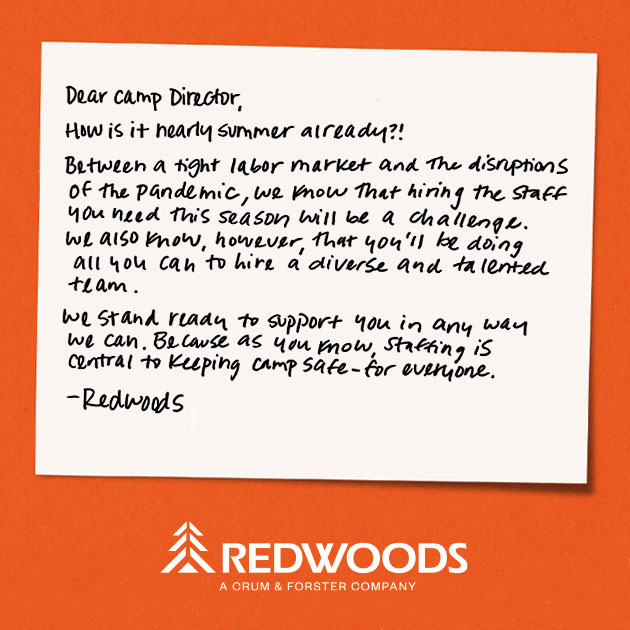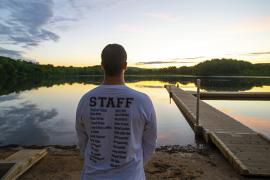My first camp director, who later became my first boss, used to implore the staff to “take advantage of your opportunities.” I have long held that chief among those opportunities is the one that allows us to positively impact the lives of children.
In turn, of course, it is important for us to challenge our campers to do the same. In that way, they invariably make new friends, try new activities, and — perhaps most important — become valued members of a camp community.
The American Camp Association (ACA) studied what we all know to be true about summer camp experiences — that they provide such outcomes as self-confidence, self-reliance, and enhanced skills through a myriad of camp activities. Indeed, camp professionals have achieved success toward realization of the critical youth development goals that the ACA identified in “Directions: Youth Development Outcomes of the Camp Experience.” Here are 10 documented gains by kids at camp across four broad yet important categories (ACA, 2022).
Positive Identity Formation
- Self-esteem
- Independence
Social Skills
- Leadership
- Friendship skills
- Social comfort
- Peer relationships
Physical and Thinking Skills
- Adventure and exploration
- Environmental awareness
Positive Values and Spirituality
- Values and decisions
- Spirituality
Other important personal gains from being at camp include a more robust view of “community” and the value of giving back to the residential and school environments to which our campers will return.
Here are three poignant examples of that very point:
Julie
The most efficient way I can advise counselors to inspire entrepreneurial skills is to take initiative and lead by example. Most campers admire spontaneity and a willingness to try something new. Whether you make up a new game for the group or start a nightly tradition in the cabin, the kids will appreciate it. If you expect your campers to gain the skills of a leader, you must show them how to be a leader. All you need to do after that is allow them space and time to learn how to use the skills you have modeled for them.
Justin
Some say that a leader is merely a person who holds a position of authority. I think that a leader is not defined by a title but by action. I believe that the mark of a true leader is someone who is able to recognize a problem and address it with a solution. At camp, I learned from leaders who promoted ways to create positive change. Now I am president of my class at Colby College.
Last fall, one of my fellow students, Christina, came to me with a problem. She is a student with a learning difference. Many times, students with learning differences are as smart or even smarter than their peers; their problem lies in their ability. Students with learning differences may have difficulty reading, writing, spelling, reasoning, recalling, and/or organizing (Learning Disabilities Online, 2010). Christina felt that the college was unable to accommodate or provide assistance for her educational needs. She and many other students with diagnosed learning differences say they struggle academically due to their disabilities and the college’s lack of assistance. In my eyes, this was an injustice, so I began to research the college’s policy on learning differences to see what kind of resources the school provided. It became apparent that something needed to be done.
I set up a Learning Differences Task Force, comprised of several passionate students — some who have diagnosed learning differences and some who do not. Our goals are to increase awareness of learning differences, educate our peers about the struggles that come with having one, and gain a commitment to assisting students who need help. We want to raise consciousness about learning differences in the entire Colby community, including students, professors, administrators, and trustees. We are creating social change from the bottom up. As a leader, I have a duty to try to make life better for others.
Pierce
As a participant for many years in the Walk for Hunger (a yearly fundraiser that helps those in need in Massachusetts receive sustainable, reliable access to nutritious food), it was odd that I had never questioned what it would be like if I needed food assistance. You see, I have celiac disease, which prevents me from eating food that contains gluten. When I asked my mom that exact question only two years ago, she didn’t know what to tell me. This eventually led me to do some research and, after visiting a few local food pantries, I realized that no assistance was being offered to celiacs in need. This was when I knew I had to do something. I knew that some kids just like me were having to make the decision between becoming sick and going hungry. The knowledge that people were suffering and nothing was being done for them led me to start Pierce’s Pantry, a “gluten-free food bank” that provides safe food to celiacs who require it.
While many people can easily identify problems in their communities, most don’t take the leap into action. This difficult yet vital step of progressing from identifying a problem to solving a problem is something I believe camp allowed me to take. For example, the best counselors are the ones who initiate games and activities during times when nothing is going on. Taking this type of initiative helped me develop rapport with my campers and increased my self-confidence.
When I first began Pierce’s Pantry, the task ahead seemed daunting. How was I, a kid, going to do so much? I had felt this feeling before though. As a junior counselor, I had a lot of requirements, some of which seemed impossible to complete at the beginning of the summer. However, as the summer went on, I continued to check off requirements until I realized that I was going to complete them with time to spare! It was the same with Pierce’s Pantry. I started little by little, accomplishing small goals one at a time. Now I have partnered with a large national organization that hopes to help me put a pantry in every state!
Julie, Justin, and Pierce also shared some of the personal traits they acquired at camp that helped them to help others:
- Determination
- Independence
- Accountability
- Sense of Self
- Organization
- Respectfulness
- Initiative
- Dependability
- Patience
- Trustworthiness
- Cooperation
- Industriousness
- Loyalty
- Responsibility
- Creativity
- Inventiveness
When you can imagine similar campers with similar outcomes, you begin to see a path that leads from summer camp to a better world.
Exemplifying a camp that works toward this objective is the Louis August Jonas Foundation’s (LAJF) Camp Rising Sun in New York (LAJF, 2022).
For 90 years, LAJF has been committed to helping young people grow intellectually, ethically, and globally. We do this by operating our Rising Sun programs. Camp Rising Sun is our full-scholarship, summer leadership program for teenagers from more than 30 different countries and 10 US states. Each summer, 60 young men and 60 young women practice leadership skills in a supportive community of peers and counselors.
The mission of the Louis August Jonas Foundation is to develop in promising young people from around the world a lifelong commitment to compassionate and responsible leadership for the betterment of their communities and the world.
We seek to:
- Foster an appreciation of both diversity and our common humanity
- Expand intellectual horizons and heighten artistic sensibilities
- Develop leadership abilities and self-reliance in a safe environment
- Offer and demonstrate a philosophy of living to serve society through the pursuit of humanitarian goals
Leaving the world a better place, for sure.
While we may be inclined to think that the communities we create each summer have a shelf life of approximately seven or eight weeks, we know in our hearts that those unique collaborations endure for years and, perhaps, forever.
The recent fourth anniversary of the shootings at Marjory Stoneman Douglas High School in Parkland, Florida, reminded me of the salience and resiliency of the construct of camp as a community and the “long after summer is gone” efforts of camps deeply impacted by that tragedy (Wallace, 2018).
Of course, engendering an affinity for civic engagement, at home or abroad, following a tragedy or in support of inclusion and a sense of belonging, necessarily requires a large dose of intentionality along with social-emotional learning. It also requires the intention to help raise confident, capable youth with a proclivity to “give something back” that comes with a commitment to develop meaningful relationships with campers. In visiting different camps, it is easy to see those that are built around the nuances of mentoring relationships versus those that may be more transactional, making sure the buses are on time and the meals ready to eat for lunch or dinner, for example.
It’s important that cabin/tent counselors spend one-on-one time with each camper each day, inquiring about how they are feeling, what happened during their day (good and not so good), and what they hope to accomplish tomorrow.
Through email, I asked three former campers for their thoughts on how camp professionals and staff can help them to make the world a better place. Here is what they had to say.
Thomas Andaloro
Every camper looks up to their counselors no matter what, and when people in these positions engage kids with a having-fun attitude first and foremost, the kids always follow suit and will open up about themselves and make stronger connections with other kids and the counselors they see every day. All kids deserve to have the opportunities to participate in high-energy environments such as a camp full of outdoor and social activities. This allows children to appreciate life and communicate with each other without being sucked into a screen — an important opportunity that is becoming harder and harder to come by these days.
As a camp staff member, the positive impact and magic you give to the kids, all based on how you approach and interact with them, is something that brings great pride and happiness. This is magic that every counselor has the chance to create for the kids they work with, and it is something that they will have with them for the rest of their lives.
Cameron Gray
The question of camp staff making children better people has an answer that revolves around two things, the first being making the children more confident overall, and the second making them more caring and aware of the world and people around them. Some activities that do this are theater productions and all-camp days (Olympic Games). Another way staff can leverage their work is by being incredibly adaptable to any situation. In my experience, we had days where thunderstorms rolled through, and we were stuck in the cabin all day. I used this opportunity to work on trust games, get to know these campers on an emotional level, and also take care of a child who was anxious from the thunderstorm. Being adaptable is the biggest key when it comes to staff.
Catie Klein
I would advise camp professionals to always treat the campers with kindness and respect and to give them a sense of responsibility. I have learned, through being both a camper and counselor, that each lesson taught at camp, whether it be intentional or unintentional, will impact the campers once they leave the doors of the camp. Make these lessons positive, and treat campers the way you would want to be treated.
Words and advice to live by.
Just imagine it — every day of every summer you and your staff (and ultimately your campers) have the opportunity to leave the world a better place.
Photo on page 53 courtesy of Camp Spearhead, Marietta, SC.
Stephen Gray Wallace, MS Ed, is a doctoral candidate in the Institute for Ethical Leadership at St. Thomas University in Miami. He is also an associate research professor and president and director of the Center for Adolescent Research and Education (CARE). Stephen has broad experience as a school psychologist and adolescent/family counselor. He is a member of the professional development faculties at the American Academy of Family Physicians and American Camp Association and a parenting expert at kidsinthehouse.com, NBC News Learn, and WebMD. He is also an expert partner at the Risk Assistance Network & Exchange (RANE) and was national chair and chief executive officer at SADD for 16 years. Stephen is an award-winning writer and author of the books Reality Gap and IMPACT. Additional information about Stephen’s work can be found at StephenGrayWallace.com.
References
ACA. (2022). Directions: youth development outcomes of the camp experience. Research and Evaluation. ACAcamps.org/resource-library/research/directions-youth-development-outcomes-camp-experience
LAJF. (2022). Our mission and history. lajf.org/what-we-do
Wallace, S. (2018). No retreat: convening communities of caring in times of loss and grief. Camping Magazine. September 2018. ACAcamps.org/resource-library/camping-magazine/no-retreat-convening-communities-caring-times-loss-grief
Wallace, S., Barbera, J., Deckert, J., & Keegan, P. (2013, May). Change agents: Social entrepreneurship and the summer camp experience. With Julie Barbera, Justin Deckert, and Pierce Keegan. Camping Magazine. ACAcamps.org/resource-library/camping-magazine/change-agents-social-entrepreneurship-summer-camp-experience



